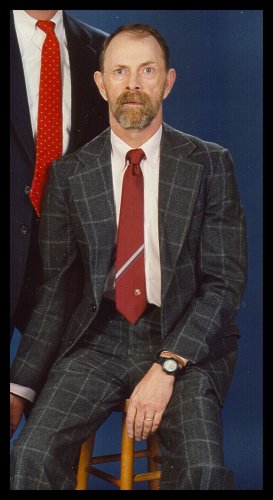 Johnny died at 5:40 PM on Friday, February 19, 1999. At that moment, Eric was checking out of a hotel in Okinawa, Japan, waiting for transportation to the airport to begin the 24-hour trip back home. He first learned of Johnny's death when he arrived home late on the afternoon of Saturday, February 20.
Johnny died at 5:40 PM on Friday, February 19, 1999. At that moment, Eric was checking out of a hotel in Okinawa, Japan, waiting for transportation to the airport to begin the 24-hour trip back home. He first learned of Johnny's death when he arrived home late on the afternoon of Saturday, February 20.
For two years Eric had been central to planning a major conference with Japanese counterparts. This was his work. The appointed dates for the conference were February 17 to 19; the place was to be Okinawa, Japan. The occasion was important, and providing the extensive technical background that the US team needed was Eric's work.
Both Eric and Johnny had been proud of his work. They had known for a long time that these were his plans. As the time came nearer, it also became apparent that it would strike in the midst of Johnny's final crisis. There was no answer to the dilemma. By this time, Johnny had already lost the power to talk. His vital signs remained strong, but he no longer could eat. He had not had more than a few eyedroppers of water in several days. He didn't have the strength or will to swallow. His body was wasting.
Eric decided to go but cut back the schedule to absolute minimum: just enough time to move into the heart of the conference and return immediately after its conclusion.
The time to depart came. It was early Sunday morning, February 14. Eric had to leave by 6:30 AM if he were going to catch the plane from National to Tokyo. He came to Johnny's bedside in the makeshift sick room they had made of the downstairs just after 6:00 AM.
It was dark outside and inside. Only the night light was on - a soft Japanese paper lantern in the shape of a pyramid in a corner of the room. Eric sat down in the stool by the side of the bed. They'd put it there to make feeding Johnny and holding his hand easier. The temporary table with all the medications, wipes and clutter of sickbed paraphernalia was behind him.
He took Johnny's hand. It was hard to tell if Johnny was awake or not. His responses were no longer certain. He remained silent, eyes closed. Eric told him it was time for him to go, that he'd be back in six nights, and that Johnny was to wait for him, no matter what. He continued to talk to him briefly in this manner, and when he thought he'd said as much as he could, he moved to go.
At that moment, Johnny responded. He said nothing, he didn't move, he didn't open his eyes. His hand simply grasped Eric's hand tightly, more tightly than Eric had thought possible for him anymore. Eric sat back down and held on to Johnny. They remained like that for some time in silence. Johnny then relaxed his grip. Eric leaned over to whisper goodbye. He kissed him and told him once again that he smelled good with his lotion. Eric went out to the car and drove off to the airport in the dark.
Eric called back home from Japan as soon as he settled into his hotel room and twice a day after that, morning and night. The conference ended Friday night, and he checked out of his hotel room at about 7:30 AM the next morning, after having made a final call home. For the first time, Tona, who was nursing Johnny for the week with Don while Eric was gone, said his vital signs had begun to deteriorate. She was using the cordless phone.
Eric asked Tona to put the phone up to Johnny's ear. She did. Into the silence Eric told Johnny that he was on his way home, to wait for him if he could, but that if, just if, Johnny couldn't wait, if he had to go on ahead, it was okay, he'd understand. He said this several times. Silence continued from the other end. He hung up the phone in Okinawa and began the long journey home.
There was little to be said for the journey home except for the tension. When he arrived home, it was already dark. He walked in. Tona and Don greeted him, and then Tona gently told him what had happened.
He went into the living room. It was empty. The rental company had already picked up the hospital equipment and oxygen tanks. Only the soft glow of the night light in the darkness remained the same.
Eric wept. Tona and Don did what they could to provide comfort in the midst of their own grief. When it was quiet again, Tona told him the following.
While Eric had been talking to Johnny through the phone from Japan the night before, she noticed rapid eye movement beneath the thin, closed lids. Johnny died very shortly after that. It was a sign, she said.